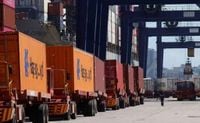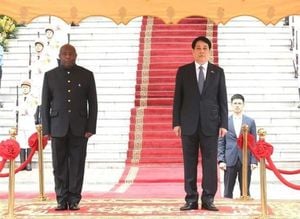Donald Trump has ignited a global trade war by announcing a significant increase in tariffs on imports from around the world, and Africa is feeling the brunt of these changes. The new measures, which come into effect on April 5, 2025, include a universal base tariff of 10% on all U.S. imports, with reciprocal tariffs set to follow on April 9, targeting countries that impose high tariffs on American products.
Among the hardest-hit nations are Lesotho, Madagascar, and Mauritius, which will face staggering reciprocal tariffs of 50%, 47%, and 40%, respectively. These tariffs are a part of Trump's broader strategy to rectify trade imbalances, with the White House stating that the tariffs aim to level the playing field between the U.S. and its trading partners.
South Africa has been particularly singled out, facing a 30% reciprocal tariff as part of Trump's punitive measures. The South African Presidency expressed its concern over these tariffs, labeling them as "unilateral and punitive" and stating that they pose significant obstacles to trade and shared prosperity. In an official statement, the South African government reiterated its commitment to fostering a mutually beneficial trade relationship with the U.S., while also emphasizing the urgency of negotiating a new bilateral trade agreement.
Trump's administration has justified these tariffs by claiming that South Africa has imposed tariffs as high as 60% on U.S. products. The U.S. tariffs, therefore, are seen as a response to what Trump describes as unfair treatment. However, this approach has drawn criticism from economists who argue that such measures could lead to unintended consequences, including a potential escalation in trade tensions.
In addition to South Africa, several other African nations are facing significant tariffs. Countries like Angola will see tariffs of 32%, while Namibia and Ivory Coast will be subject to 21% tariffs. The situation is further complicated for Nigeria, which will face a 14% tariff, a stark contrast to the 10% tariff applied to countries like Kenya, Ghana, Ethiopia, and Uganda.
The timing of these tariffs coincides with a broader pattern of diminishing U.S. engagement in Africa. Recently, the U.S. State Department confirmed the dismantling of USAID programs, which accounted for a quarter of the development aid funding to the continent. This withdrawal has raised alarms among African leaders, as it threatens crucial support for health initiatives and other development projects.
These new tariffs also signal the likely end of the African Growth and Opportunity Act (AGOA), which has provided many African countries with duty-free access to the U.S. market. The impending tariffs suggest that the AGOA framework, which is due to expire in September 2025, will not be renewed, marking a significant shift in U.S. trade policy toward Africa.
Countries like Lesotho and Madagascar, which are heavily reliant on exports to the U.S., are now facing dire economic consequences. The tariffs could severely impact their economies, which are already struggling with various challenges. Lesotho, for example, has now become the most affected nation, with a staggering 50% tariff on its exports to the U.S.
In contrast, nations that have aligned more closely with U.S. interests, such as Kenya and Ghana, will only face the base tariff of 10%. This distinction highlights the geopolitical dimensions of Trump's tariff strategy, where trade policies are intertwined with diplomatic relations.
South Africa's government has been vocal about its concerns, with officials recently returning from the U.S. after clarifying misunderstandings about the country’s stance on various issues. Chrispin Phiri, a spokesperson for the Department of International Relations and Cooperation, noted that these dialogues aim to foster a more nuanced understanding of South Africa's policies, particularly regarding human rights and land reform.
The controversial Expropriation Law in South Africa, which allows for land to be taken without compensation in certain circumstances, has been a focal point of criticism from the Trump administration. Trump has characterized this law as discriminatory against the Afrikaner minority, prompting him to cut aid to South Africa and suggest resettlement options for Afrikaners in the U.S.
As tensions rise, the implications of these tariffs extend beyond mere economics. They reflect a broader geopolitical struggle, with the U.S. seeking to assert its influence while simultaneously pushing back against nations it perceives as adversaries. The situation in South Africa, with its complex history and ongoing issues related to land and race, exemplifies the challenges facing both the U.S. and African nations in navigating this new trade landscape.
Overall, the new tariffs imposed by Trump represent a significant shift in U.S. trade policy towards Africa, marking a departure from previous engagement strategies that sought to promote economic growth and partnership. As African nations grapple with these changes, the long-term effects on their economies and relationships with the U.S. remain to be seen.






